Complex treatment of stomach ulcer drugs. Medicines for the treatment of gastric ulcer
Treatment with drugs for stomach ulcers involves the use of certain groups medications... Some are prescribed as pills, others as injections. The goal of drug use is to return the disease to permanent remission. When treating stomach ulcers, only folk recipes the expected result is unlikely to be achieved, moreover, there is a risk of deterioration in the general condition of the patient. A number of pharmacological drugs are used to treat the disease. Before starting therapy, you should consult your doctor.
The effectiveness of drug therapy
The chronic form of the disease must be treated using drugs. Through a number of pharmaceuticals, it is possible to achieve a rapid recovery of peptic ulcer disease, eliminate inflammation pain and other discomfort.
In the process of taking a biopsy, a macropreparation is able to show the stage of restoration of epithelial cells.
Improvements in well-being can be achieved by adjusting the menu and using traditional medicine. Effectiveness after such therapy may come over time, but it often takes a long amount of time to get the result. Applying modern medications, with proper use, a positive change is noticeable after a week. To confirm the results of the diagnosis, tissue is taken for a biopsy, and a macro specimen is made. Analogues among the drugs used in folk medicine, No. For example, synthetic analgesics for gastric ulcer (Omez, Ranitidine).
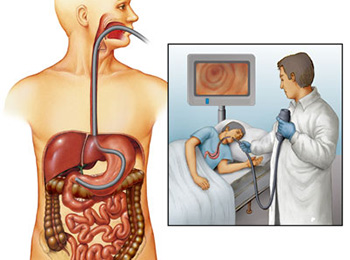 In order for drug therapy to achieve proper results and without prejudice to health, it is prescribed by a physician or gastroenterologist. Self-treatment can give undesirable complications for the patient. From time to time, endoscopic diagnostics are carried out, a tissue biopsy is taken for a macro specimen.
In order for drug therapy to achieve proper results and without prejudice to health, it is prescribed by a physician or gastroenterologist. Self-treatment can give undesirable complications for the patient. From time to time, endoscopic diagnostics are carried out, a tissue biopsy is taken for a macro specimen.
Certain medications by themselves can trigger an exacerbation. These include aspirin, paracetamol. If you use aspirin on an empty stomach randomly, stomach ulcers will form in the shortest period of time.
Indications for drug therapy
Indications for drug therapy are:
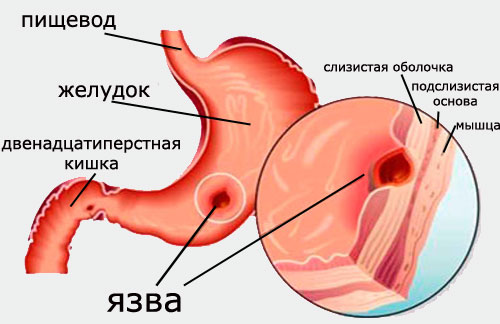
Contraindications to drug therapy
In addition to direct indications, most of the drugs have contraindications for use:
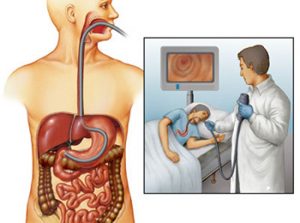
Main subgroups
Medications with gastric ulcer, it is customary to divide into certain subgroups. They differ in the principle of impact and the final result.
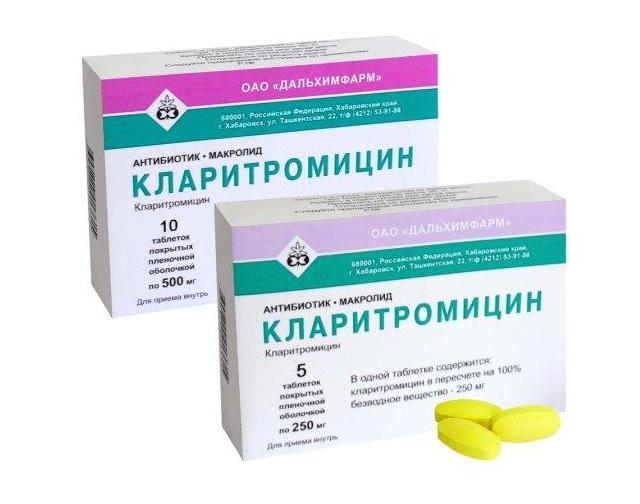
Antibacterial agents
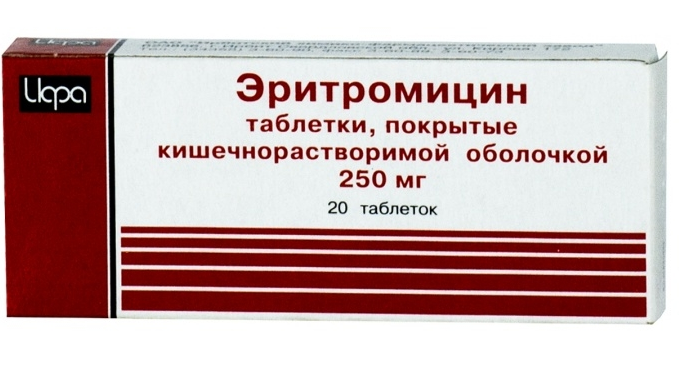 Antimicrobial agents are aimed at eliminating the helicobacter pylori bacteria inside the stomach - the causative agent of stomach ulcers and gastritis. For the most part, this microorganism is responsible for the formation of the disease.
Antimicrobial agents are aimed at eliminating the helicobacter pylori bacteria inside the stomach - the causative agent of stomach ulcers and gastritis. For the most part, this microorganism is responsible for the formation of the disease.
Treatment is often prescribed that includes antibiotics. The funds are prescribed in the form of tablets and injections. These include Clarithromycin, Erythromycin, Tetracycline.
In addition to the above drugs, the scheme may contain the drug Trichopolum during the illness. It is characterized by antimicrobial and antiprotozoal action.
Antibiotics, such as Clarithromycin, are prescribed to treat stomach ulcers and are used prophylactically. It is necessary to carefully approach the use of funds of this subgroup, since this can cause dysbiosis and diarrhea. Drugs are prescribed under the supervision of a specialist with constant testing.
Antacids
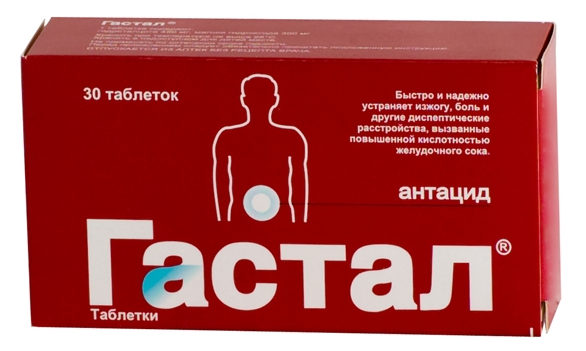 The drug subgroup is used as antiseptics, enveloping and absorbing drugs. They protect the mucous membrane from aggressive factors, promote the elimination of toxic substances, reduce activity of hydrochloric acid and enzymes that corrode the gastric mucosa and maintain inflammatory processes... It is more expedient to use them than Activated carbon or polysorb.
The drug subgroup is used as antiseptics, enveloping and absorbing drugs. They protect the mucous membrane from aggressive factors, promote the elimination of toxic substances, reduce activity of hydrochloric acid and enzymes that corrode the gastric mucosa and maintain inflammatory processes... It is more expedient to use them than Activated carbon or polysorb.
This subgroup includes tablets for peptic ulcer disease - Gastal or Sodium bicarbonate. Fosfalugel, Maalox, Almagel are prescribed as suspensions. Such drugs provide an auxiliary effect in treatment regimens for the disease. Festal is used in a complex way in order to improve assimilation.
Histamine receptor blockers
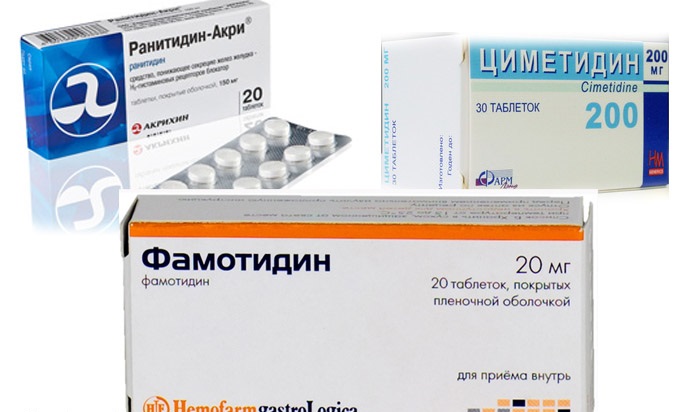 This subgroup is used to block the excessive secretory activity of the glands in the gastric walls. The funds are involved in disabling parietal cells, which are responsible for the production of hydrochloric acid and gastric acid enzymes. Decreases aggressive impact of the gastric juice itself, inflammation is relieved.
This subgroup is used to block the excessive secretory activity of the glands in the gastric walls. The funds are involved in disabling parietal cells, which are responsible for the production of hydrochloric acid and gastric acid enzymes. Decreases aggressive impact of the gastric juice itself, inflammation is relieved.
The drugs in this subgroup include several generations. The first is Cimetidine. To date, such a drug against the disease is actually not used. Second generation Ranitidine, Nizatidine, Famotidine and other tablets in the treatment of ailment. In the process of using paracetamol and aspirin, the disease is constant adverse effect... Therefore, Ranitidine is often prescribed for prophylaxis.
Group of gastroprotectors
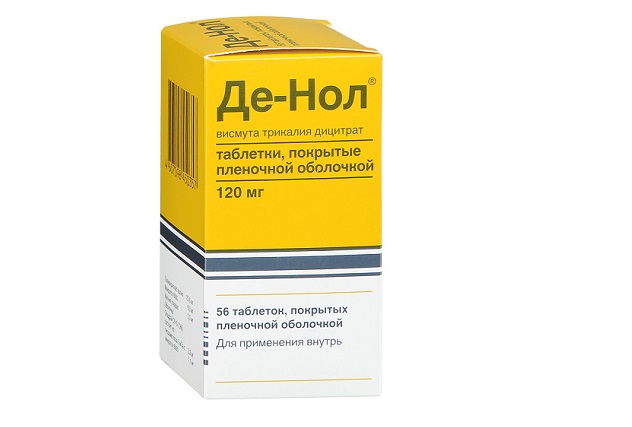 Drugs in the treatment of peptic ulcer disease duodenum and the stomach include bismuth and some chemicals. They are characterized by a pronounced anti-inflammatory effect, reduce painful sensations from this disease... It is not recommended to use anesthetics or Paracetamol for these purposes, this contributes to a deterioration in well-being. Gastroprotective agents have a slight antibacterial effect, less than, for example, Clarithromycin. The subgroup of medicines is used to treat exacerbations of the disease, as well as in how prophylactic agent, during the course of treatment of gastritis.
Drugs in the treatment of peptic ulcer disease duodenum and the stomach include bismuth and some chemicals. They are characterized by a pronounced anti-inflammatory effect, reduce painful sensations from this disease... It is not recommended to use anesthetics or Paracetamol for these purposes, this contributes to a deterioration in well-being. Gastroprotective agents have a slight antibacterial effect, less than, for example, Clarithromycin. The subgroup of medicines is used to treat exacerbations of the disease, as well as in how prophylactic agent, during the course of treatment of gastritis.
Preventive measures of peptic ulcer disease through the above drugs are carried out during acute or chronic form gastritis. The most popular drugs in this subgroup are Venter, De-Nol during the ulcer period, Solcoseryl, Misoprostol. The drug De-Nol is the agent of choice in a situation where treatment with other methods is ineffective in case of duodenal ulcer disease.
Proton pump inhibitors
Omeprazole is considered a common representative of this subgroup for gastric ulcer. Also, an indication for the use of the drug is the treatment of duodenal ulcers. For preventive purposes, it is advised to use Paracetamol in the treatment process. It is allowed to use Omeprazole as a prophylactic agent for this disease. From time to time, a biopsy should be done and the macropreparation should be assessed.
Other drug subgroups
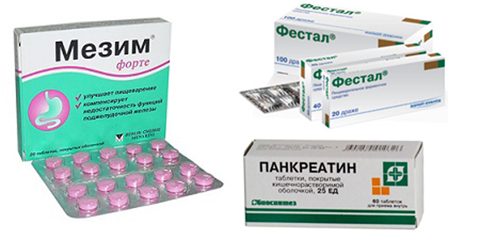 Atropine in the disease is used as an antispasmodic and as a drug that lowers the secretory activity of parietal cells of the stomach. The medicine, along with sodium bicarbonate, includes Bicarbon in the treatment of ailment. The action of the drug is similar to Ranitidine. To improve the digestive processes during an exacerbation, enzymes are prescribed - Festal, Mezim, Maalox.
Atropine in the disease is used as an antispasmodic and as a drug that lowers the secretory activity of parietal cells of the stomach. The medicine, along with sodium bicarbonate, includes Bicarbon in the treatment of ailment. The action of the drug is similar to Ranitidine. To improve the digestive processes during an exacerbation, enzymes are prescribed - Festal, Mezim, Maalox.
To treat stomach ulcers and remove toxic substances into certain situations use activated carbon or polysorb. After consuming coal, a full course of therapy is carried out using one of the schemes. It is not advised to drink Paracetamol, Aspirin, Diclofenac, which can provoke an exacerbation of the disease. The signs of healing are the elimination of clinical symptoms and a macro-preparation on which recovery processes are found.
Preventive measures
A stomach ulcer needs periodic preventive therapy and dynamic monitoring of the general condition of the gastric mucosa.
Preventive measures are as follows:

Diseases of the gastrointestinal tract are characterized by a tendency towards chronicity. Therefore, it will be important to pass full course treatment and prevention of recurrence of the disease. But it will be optimal - not to allow erosion of the stomach or 12-duodenum to develop.
The basis of modern therapy for gastric and duodenal ulcers is drugs. It should be said that there are no differences in drug therapy for ulcers of the above organs.
Before purchasing (as well as before using) any product, you must carefully read the instructions, focusing not only on the indications and dose, but also on contraindications and possible side effects. When the indicated remedy is contraindicated, another medication should be purchased, in consultation with a specialist. Knowledge about side effects will make it possible to identify the emergence of any new sensations and treat them appropriately.
Drug therapy for gastric ulcer and duodenal ulcer includes the use of several groups of drugs. Some are prescribed in tablet form, others - in the form of injections or drip infusions. The purpose of prescribing these groups of drugs will be to return the disease to the stage of stable remission.
If you treat a disease that affects the stomach and intestinal tract, using exclusively traditional or alternative medicine, it will not bring desired effect, and can worsen the patient's condition. It is known that folk remedies are significantly inferior to drugs in terms of effectiveness. Often in alternative medicine hydrogen peroxide is used to treat stomach ulcers.
For drug treatment, not one specific medicine for stomach ulcers (for example, festal) is used, but a number of pharmacological groups. Some are designed to influence the cause of the disease, others - on individual pathogenetic links.
A competent combination of drugs will give a steady improvement, the doctor should select the options.
The attending physician will perform a full examination, recommend which pills to take for stomach ulcers.
So that the drug treatment proceeds with positive result and safely, the therapist or gastroenterologist prescribes such. Self-medication attempts will show dire consequences for the patient. Endoscopic examination is periodically carried out, a tissue biopsy is taken for a macro specimen.
A number of drugs themselves are capable of causing an exacerbation. These include aspirin, paracetamol. With the uncontrolled use of aspirin on an empty stomach, a stomach ulcer is formed in the shortest possible time.
Indications and contraindications
Medicines show a number of conditions when the use of these is strongly discouraged. Let's take a closer look.
List of indications for drug therapy
- Pronounced exacerbation of the ulcerative process.
- Lack of improvement with prolonged and strict adherence to a special anti-ulcer diet, taking funds like festal.
- Explicit progression of clinical symptoms in gastric ulcer.
- If the cause of a peptic ulcer is an infectious agent. Antimicrobial drugs, for example, trichopolum for stomach ulcers, are considered the drugs of choice.
- The appearance of intense pain syndrome, which does not disappear with the help of home recipes. Maalox, ranitidine or omez taken at night will help relieve acute pain.
- In the presence of clinical signs ulcerative bleeding.
- When the period of remission is reached, the ulcer is prevented with medication.
Contraindications to drug treatment
In addition to direct indications, most drugs have contraindications for use.
- Profuse bleeding in the acute period of the ulcerative process.
- Severe allergic reaction or the presence of anamnestic information about the previous allergy to the proposed medication.
- Individual intolerance to a particular drug or component. If signs of intolerance appear, they immediately stop taking the drug and take activated charcoal. Often allergic reactions arise on antibiotics - clarithromycin, amoxiclav, maalox.
- A number of drugs are contraindicated during pregnancy and breastfeeding.
- The presence of a number of severe concomitant diseases – diabetes mellitus, renal, liver failure, HIV infection.
- Recently carried out vaccination against a number of infectious diseases.
- Childhood.
- Systemic infections - abscesses, phlegmon, sepsis.
Main groups
Drugs for the treatment of stomach ulcers are divided into several broad groups. They differ in the mechanism of action and the final effect. In practical gastroenterology, it is customary to use these groups medications for the treatment of ulcers.
- Antibacterial drugs - clarithromycin, amoxiclav for stomach ulcers, trichopolum, metronidazole.
- Antacid substances - reducing the acidity of gastric juice, protecting the walls of the stomach - Maalox. Activated carbon and polysorb have this function in part.
- Drugs that block the endings of histamine receptors.
- Means that suppress the functions of the proton pump - omeprazole for stomach ulcers.
- Medicinal substances that promote tissue regeneration - for example, actovegin, solcoseryl.
- Medicines that relieve inflammation and pain in the stomach are gastroprotective agents.
- Myotropic antispasmodics, used to eliminate pain, are true analgesics.
- Substances that reduce secretion in the stomach - anticholinergics and ganglion blockers.
- Antiemetics.
- Triple circuit and quad circuit.
- Other medications - polysorb, activated carbon, hydrogen peroxide, festal.
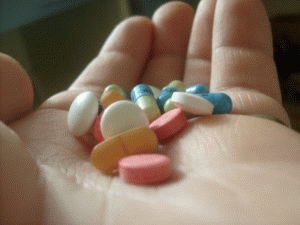
Antimicrobial agents
Antibacterial drugs are aimed at destroying the microbe Helicobacter pylori in the stomach - the causative agent of peptic ulcer disease and gastritis. The vast majority of bacteria are responsible for the development of peptic ulcer disease.
Usually, a regimen is prescribed that includes a number of antibiotics. The drugs are prescribed in tablet form for oral administration and injection. These include Clarithromycin, Erythromycin, Amoxicillin, Amoxiclav, Tetracycline.
In addition to the named medications, the drug regimen includes the drug Trichopolum for stomach ulcers. The substance has antibacterial and antiprotozoal effects.
Antibiotics, such as clarithromycin, are prescribed for ulcer therapy and prevention. Care should be taken when prescribing antibiotics, it is fraught with the development of dysbiosis and diarrhea. Prescription of drugs is carried out under the supervision of the attending physician with regular laboratory tests.
Antacids
The drug group is used as antiseptic, enveloping and absorbing agents. They protect the gastric mucosa from aggressive factors, remove toxins, reduce the activity of hydrochloric acid and enzymes that corrode the gastric mucosa and support the inflammatory response. Funds are much preferable to activated carbon or polysorb.
The drugs of the group include tablets for stomach ulcers - gastal or sodium bicarbonate in oral form. In the form of suspensions, Fosfalugel, Maalox, Almagel are prescribed. These agents complement the therapeutic regimens for duodenal and gastric ulcers. In the complex, a festal is prescribed to improve the assimilation processes
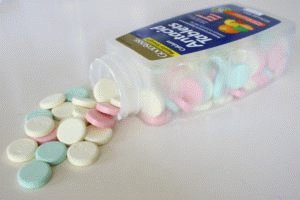
Histamine receptor blockers
A group of substances is used to block excess secretory activity of the glands in the walls of the stomach. The drugs turn off the parietal cells responsible for the production of hydrochloric acid and gastric acid enzymes. There is a decrease in the aggressive effect of gastric juice on the walls of the stomach, and the inflammatory process decreases.
Histamine receptor blockers go back several generations. The drug Cimetidine belongs to the first generation. Now this remedy against ulcers is practically not used. The second generation of histamine receptor blockers is presented on pharmaceutical market drugs Ranitidine, Nizatidine, Famotidine and other tablets for the treatment of ulcerative processes. When taking paracetamol and aspirin, the stomach ulcer becomes frequent complication... Therefore, ranitidine is often prescribed with preventive purpose.
Gastroprotectors
Means for the treatment of duodenal ulcers and stomach ulcers contain bismuth and a number chemical substances... The drugs have a pronounced anti-inflammatory effect, reduce pain from duodenal ulcers. It is not recommended to take painkillers or paracetamol for this purpose, this can only worsen the situation.
Gastroprotective agents have a slight antimicrobial effect, although less than, for example, clarithromycin. Group medicinal substances is used not only for therapy acute period ulcers of the stomach or intestines, but also for a preventive purpose, when a course of treatment for gastritis is carried out.
Prevention of stomach ulcers with the help of these drugs is carried out for acute or chronic gastritis. The most famous in the group of drugs for stomach ulcers and duodenal ulcers are Venter, De Nol for stomach ulcers, Sucralfat, Solcoseryl, Misoprostol. The drug De Nol is the means of choice when treatment with other drugs is ineffective in case of a stomach ulcer.
Proton pump inhibitors
A well-known representative is. The international name of the drug is omeprazole. Another indication for the use of this medication was the treatment of duodenal ulcers.
Other groups of drugs
Atropine for gastric ulcer is used in the form of an antispasmodic agent and to reduce the secretory activity of the parietal cells of the stomach. The medication, together with sodium bicarbonate, is part of the Becarbon tablets for the treatment of stomach ulcers. The effect of the drug is similar to that of ranitidine. To improve digestion processes in the subacute period, enzymes are prescribed - festal, mezim, polysorb, maalox.
For the treatment of gastric ulcer and the elimination of toxins from the stomach and intestines, in some cases, activated charcoal or polysorb is used. After taking coal, a full course of treatment is carried out using one of the schemes.
Disappearance becomes signs of healing clinical symptoms and a macro-preparation on which the healing processes have been identified.
Diseases gastrointestinal tract occupy one of the leading positions, giving way to heart problems. According to WHO statistics, 95% of the population are faced with digestive problems.
The surface of the stomach is normally lined with a gel-like substance that prevents damage to the organ. When certain conditions appear, the protection becomes thinner, the parts of the organ are "exposed". Hydrochloric acid, microorganisms enter these areas, inflammation begins, ulcers appear.
The main cause of the development of gastric and duodenal ulcers is considered by many to be the microorganism Helicobacter pylori. If the only culprit was a bacterium, then the problem of peptic ulcer disease would be solved by taking antibiotics.
Irrational intake of coarse, low-quality food is what causes inflammation and makes the gastric mucosa vulnerable.
What foods provoke acidity and irritation:
- spicy food;
- coarse food, salty, dry;
- products with a lot of preservatives, substitutes;
- canned foods;
- fatty food, poorly digested;
- drinks that provoke an increase in acid and irritate the gastric mucosa: carbonated water, packaged juice, drinks containing preservatives;
- alcoholic drinks.
In addition to food, other factors can irritate the mucous membrane, increase the acidity level, and provoke the release of bile:
- taking drugs and drugs that destroy the gastric mucosa (including poisoning with household chemicals);
- long-term antibiotic therapy;
- infectious diseases;
- trauma to the digestive tract;
- stress, depression.
The first symptoms of the disease appear in adolescence... The psyche of adolescents is not stable, children are constantly under stress, against which they develop chronic diseases... If the doctor's recommendations are not followed, if there is no treatment, improper diet the condition worsens, the disease progresses, an ulcer occurs at the site of inflammation.
Learn about the causes of stomach ulcers from the proposed video.
Types of drugs
The natural defense of the stomach against the action of hydrochloric acid is food. Patients presenting with stomach pain are assigned a strict diet. Along with the diet, doctors prescribe drugs for the treatment of stomach ulcers, which help the patient to cope with pain symptoms, reduce gastric secretion, and restore the acid barrier.
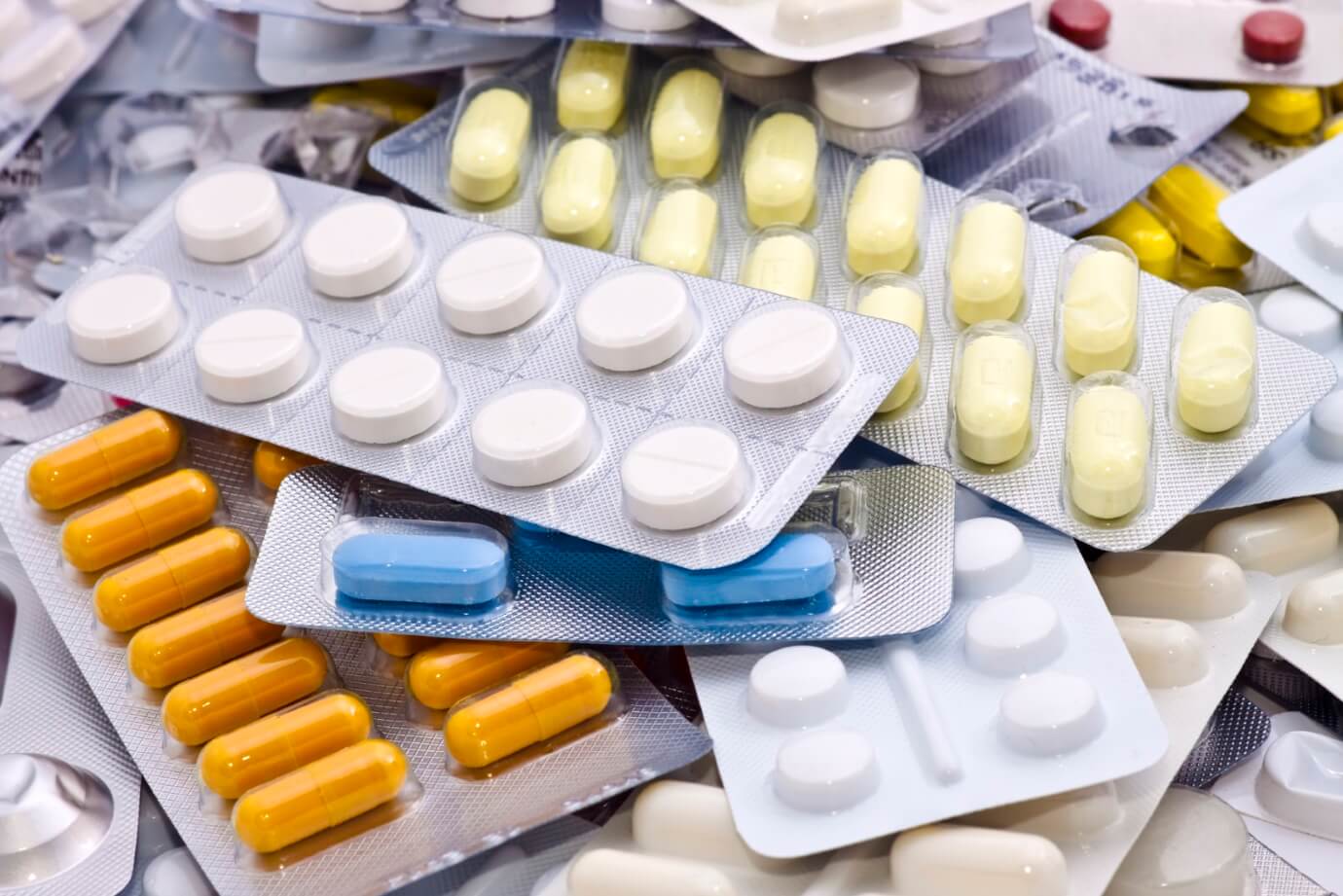
The drugs prescribed for the treatment of peptic ulcer disease are divided into classes, depending on the purpose.
- Antacids. Traditional remedies for relief of pain symptoms and affecting the secretion of the stomach. Studies have shown scarring of ulcers during the course of the use of antacids.
- Selective anticholinergics. Anticholinergics reduce the production of gastric juice, reduce acidity in the stomach, reduce pain, increase protective property food.
- H2 blockers. IN modern medicine blockers of H2-histamine receptors are prescribed to suppress the secretion of hydrochloric acid, regulate the amount of pepsin, stimulate an increase in the amount of mucus that forms the protection of the stomach, and inhibit the spread of ulcer cells. Scarring of stomach ulcers occurs within 6-8 weeks in 80-95% of patients.
- Proton pump inhibitors. In terms of antisecretory activity, PPI drugs are superior to all other drugs. When taking a daily therapeutic dose, 80-90% of the acid is suppressed. In addition, they create conditions that prevent the reproduction and spread of heliobacteria in the area of inflammation.
- Antihelicobacter drugs. A group of antibiotics aimed at suppressing the activity of Helicobacter pylori.
Pain relievers. When the course of the disease is accompanied acute pain, drugs with an analgesic effect are prescribed. - Sedatives, nootropics. These drugs restore blood circulation, reduce spasm of blood vessels, and allow patients to achieve treatment results faster.
The course of treatment is prescribed by the doctor after receiving necessary research... There are many drugs in pharmacies for the treatment of gastric ulcer, correct application and use will relieve unpleasant symptoms for a long time.
Peptic ulcer treatment methods
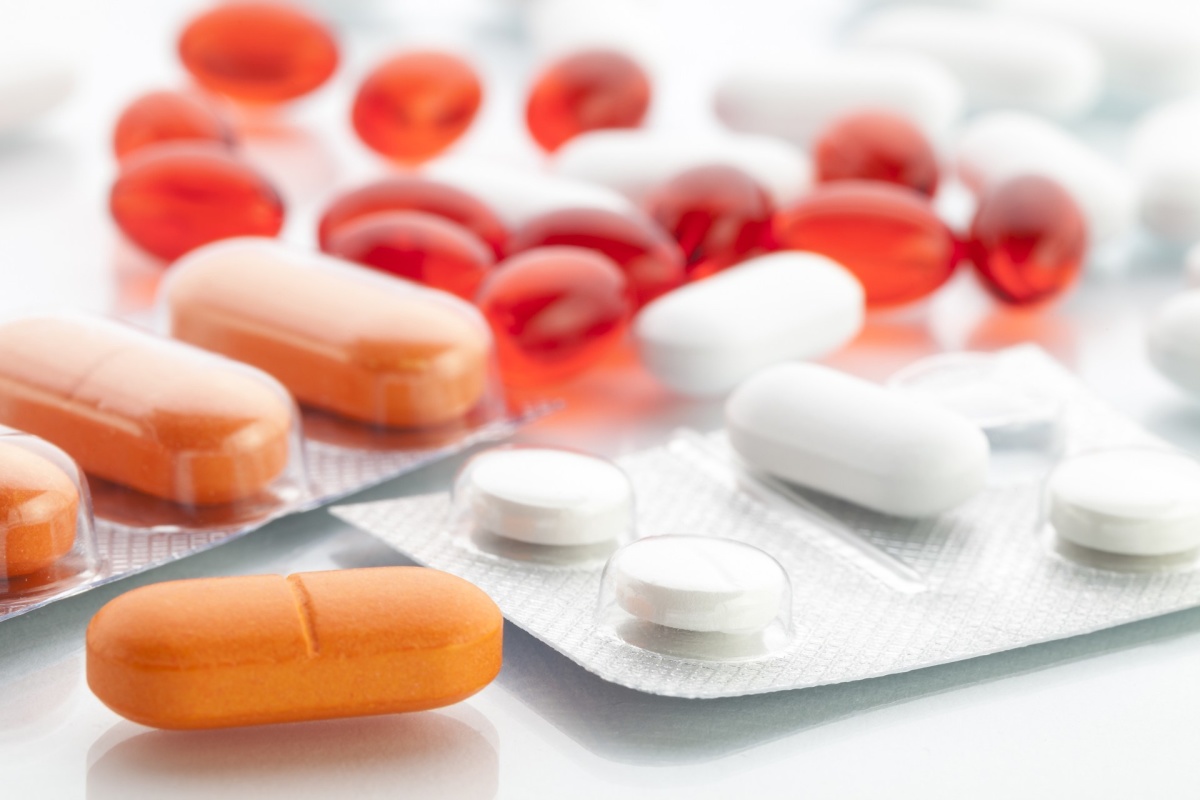
Treatment of gastric ulcer begins with adherence to the diet, recommendations for the daily regimen.
Medicines help the body cope with inflammation and speed up the scarring process.
- Maalox, Gastal, Taltsid, Almagel, Fosfalugel are modern antacids aimed at relieving pain symptoms, reducing stomach activity, and normalizing microflora. Medical publications say that taking antacids for gastritis suppresses the multiplication of heliobacteria and therefore the risk of developing ulcers is significantly reduced.
- Gastrocepil, Telenzipin - anticholinergics, which are prescribed for mild peptic ulcer disease, when there is no need to take PPIs and H2-blockers.
- Altramet, Apo-Cimetidine, Belomet, Ranitidin-Acri, Antodin, Blokatsid, Gasterogen, Gastrosidin, Pylorid, Roxan, Axid are some of the trade names for H2 blockers. These drugs are considered outdated, inferior in activity to proton pump inhibitors, and are used by patients for reasons of economy. The course of treatment with H2 blockers is cheaper than with modern inhibitors.
- Proton pump inhibitors are the broadest line of drugs for the treatment of gastric ulcer. Includes one of active substances: Omeprazole, Patnoprazole, Lansoprazole, Rabeprazole, Esomeprazole, Dexlansoprazole. They are expensive and very effective drugs, which help to quickly restore the gastric mucosa.
- Tetracycline, De-Nol, Amosin, Levolet, Klion are the most famous drugs against heliobacterium.
- No-shpa, Drotaverin, Papaverin, Ketanov are pain relievers that are used for acute pain.
Corvalol, Valerian tincture - sedatives. - Phenibut, Piracetam, Phenotropil - nootropic drugs for stabilization under stress. Patients with anxiety, depression, mental disorders, sleep disorders, toxic poisoning require additional drugs reducing the feeling of tension, anxiety.
Medicines are prescribed only in medical institution... The doctor takes into account general state the patient and the reasons that could provoke a peptic ulcer.
How to choose the right medicine?
When epigastric pain appears, some patients prefer to prescribe medication for themselves. There is a lot of data on the Internet that you need to take antibiotics to kill Helicobacter pylori.

The consequences of taking antibiotics are much more dangerous than peaceful coexistence with Helicobacter pylori, according to one of the British medical sources.
When choosing funds, many pay attention to the cost of drugs.
Naturally, modern medicines for the treatment of peptic ulcer disease are more effective and more expensive than their outdated counterparts.
It should be remembered that:
- Proton pump inhibitors are the most expensive and effective medicines... Possess pain relievers, antibacterial property, reduce the amount of acid secreted, accelerate the processes of scarring of ulcers, restore the gastric mucosa;
- H2 blockers, the precursors of PPIs, began to be used in the treatment of peptic ulcer disease in the 70s of the last century. Today, H2 blockers are used by patients who want to save money on ulcer treatment;
- Antacids are treated in cases of non-severe peptic ulcer disease;
- Antibiotics, drugs against heliobacterium, are taken only as directed by a doctor;
- Nootropic drugs, antidepressants, sedatives help prevent stress-related cramps.
The most important medicine is the right one. balanced diet, adherence to diet number 1 for stomach diseases. Medicines only accelerate the regeneration process, help to restore the mucous membrane, relieve pain.
Have you noticed a mistake? Highlight it and press Ctrl + Enter to let us know.
Nov 9, 2015 Violetta the Healer
IN pharmacy chain there are a variety of tablets for stomach ulcers. is a very common disease. The formation of a peptic ulcer is mainly due to malnutrition, alcohol abuse and the presence chronic gastritis... The list of drugs and dosage is determined only by the attending physician.
All tablets for gastritis and stomach ulcers are divided into several groups:
- gastroprotectors (De-Nol, Venter, Saytotek);
- antacids (Gaviscon, Rennie);
- proton pump inhibitors (Pariet, Nexium, Omeprazole, Pantoprazole, Omez, Lansoprazole, Sanpraz, Nolpaza, Khairabezol);
- blockers of H2-histamine receptors (Ranitidine, Zoran, Gistak, Famotidine);
- antimicrobial pills (Clarithromycin, Metronidazole, Amoxicillin, Tetracycline);
- painkillers (No-shpa, Drotaverin, Baralgin);
- blockers of M-cholinergic receptors (Gastrocepin).
The list of medicines doesn't end there. To increase the resistance of the cells of the gastric mucosa to the action of acid, synthetic prostaglandins are used. TO complementary medications include prokinetics (Domperidone), sedatives, antidepressants. With a stomach ulcer, the tolerance of the drug and the age of the patient are taken into account.
Antacids
If a person has gastritis and stomach ulcers, antacids are often used. This is large group medicines that lower the pH of the stomach. The following antacids are available in tablets:
- Gastal;
- Gaviscon;
- Rennie;
- Rutacid;
- Vikair.
Vikair tablets are one of the most modern means to reduce acidity. This is a symptomatic drug that does not affect the development mechanism and etiology of peptic ulcer disease. Vikair is combined remedy... The drug has astringent, antacid, antispasmodic and laxative effects.
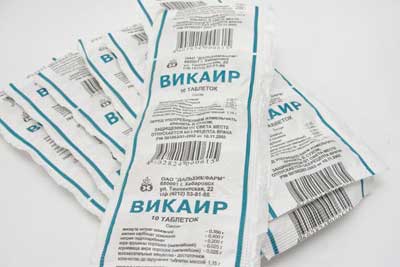
It contains magnesium carbonate, which neutralizes the resulting acid. The medicine is contraindicated in children. The indication for the appointment of the drug Vikair is ulcerative and duodenal ulcer and gastritis with high acidity. Antacids are available in the form of a lozenge and chewable tablet. Chewable medicines include Gaviscon, Rennie, and Rutacid. Gels are often used instead of tablet drugs (Phosphalugel, Almagel).
Antisecretory drugs
Stomach ulcer pills include medicines that reduce the formation of gastric juice. The synthesis of hydrochloric acid in the parietal glands is disturbed by proton pump blockers. This group includes Nexium, Omeprazole, Omez, Pantoprazole, Lansoprazole, Pariet, Khairabezol. The most commonly used and available to the population is Omeprazole. It is taken orally in capsule form.
The drug leads to a violation of the synthesis of hydrochloric acid, without which the acidity of gastric juice decreases. The use of this medication or its analogues contributes to more fast healing ulcers, reduces pain and leads to permanent remission. Omeprazole is indicated for exacerbation of peptic ulcer disease and relapses. It is not prescribed for children, pregnant women and people with intolerance to the components of the drug.
A newer generation of proton pump blockers includes Nexium. It is used in the form of film-coated tablets. The medicine takes effect within the first hour after the tablet is swallowed.
Nexium is effective for peptic ulcer disease associated with Helicobacter pylori infection. The drug can be used after bleeding from an ulcer. It contains various carbohydrates, so the medicine is not suitable for people with sucrose and fructose intolerance. Antihistamine receptor blockers are currently practically not used.
Mucosal protection
In the treatment of gastritis and stomach ulcers, gastroprotectors are almost always included in the scheme.
This group includes De-Nol and Venter. De-Nol contains bismuth dicitrate. The medicine has anti-inflammatory, astringent and bactericidal action. De-Nol kills the bacteria Helicobacter pylori.
When this agent is used, a protective film is formed on the surface of ulcers and erosions, which contributes to their healing. An increase in the resistance of mucosal cells is due to an increase in the formation of prostaglandins, bicarbonate and mucus. De-Nol reduces the activity of pepsin. This drug it is used in the phase of exacerbation of peptic ulcer disease.
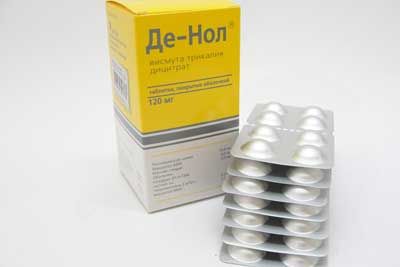
Tablets are contraindicated in renal failure, during pregnancy, children under 4 years of age, during breastfeeding and in case of individual intolerance to the drug. De-Nol rarely leads to side effects. Possible undesirable reactions diarrhea, nausea, vomiting, constipation, itchy skin, rash. Similar action possess Venter tablets.
Other medicines
Treatment of gastritis and ulcers involves the use of several drugs from different pharmacological groups at once. For peptic ulcer disease, doctors often prescribe prostaglandin E analogs. The most commonly used is Cytotec. The drug has a cytoprotective effect. This is achieved by enhancing the production of mucus and bicarbonate. The medicine acts on the parietal cells of the organ.
Cytotec provides fast and long-lasting therapeutic effect... The action of the tablets begins half an hour after their use and lasts about 3-6 hours. Cytotec is good remedy both for the treatment and prevention of ulcers. The drug is not prescribed to persons under 18 years of age, pregnant and lactating, people with hepatic and renal failure, enteritis and individual intolerance.
An important place in the treatment is given to the elimination of Helicobacter pylori bacteria. The following antibiotics are effective against these microbes:
- penicillins (Amoxicillin, Amoxiclav);
- nitroimidazoles (Metronidazole);
- macrolides (Clarithromycin).
Eradication of this infection requires the appointment of 3 or 4 drugs at once. Helicobacter bacteria live well in acidic environment, therefore, taking antibiotics is combined with antacids. Peptic ulcer disease in the stage of exacerbation gives patients great discomfort. Pain syndrome will help eliminate analgesics and antispasmodics. The latter eliminate the muscle.
Antispasmodics include: No-shpa, Nikoshpan, Duspatalin, Drotaverin. If antibiotics in the form of tablets are used against the background of an ulcer, then probiotics (Linex, Bifiform) are additionally prescribed. Drug therapy should be combined with diet. It is also required to give up alcohol. Thus, a stomach ulcer requires integrated approach to treatment. In case of non-compliance with the doctor's prescriptions or improper nutrition, the ulcer worsens again.
Pills for stomach ulcers, injections should be prescribed only by a doctor. The treatment regimen is individual in each a separate case... Especially in the case of an exacerbation of the disease. There is no such thing as an ulcer cure.
There are many drugs that work to relieve pain, reduce the production of hydrochloric acid, relieve inflammation and eliminate infection that caused a disease such as a stomach ulcer.
You should know not only what it is. But also drugs that can stop the unpleasant manifestations of the disease.
How is the treatment carried out?
Your doctor will tell you how to treat stomach ulcers. But medical treatment of stomach ulcers is usually carried out in two stages. The first lasts seven days. During this time, the person is prescribed antibiotic therapy (Metronidazole, Clarithromycin); drugs that block the increased production of hydrochloric acid (Lansoprazole, Maalox).
The attending physician can decide on the appointment of analogs of these drugs. The dosage regimen is also prescribed individually, depending on the stage of the disease.
The second stage lasts two weeks. Medicines will be prescribed if an infection (Helicobacter bacteria) is found on the stomach lining. In this case, Metronidazole, Tetracycline, Bismuth-based medicines are prescribed (they have antiseptic and astringent properties).
In addition, a person should take medications that suppress the production of hydrochloric acid by the gastric mucosa (Omeprazole, Rabeprazole), antihistamines (Ranitidine, Famotidine).
At complex treatment ulcers must be prescribed anti-inflammatory (Biogastron), painkillers (Paracetamol), antispasmodic (No-shpa), antiemetic (Motilium) drugs. They help relieve symptoms and speed up healing.
You should know the medications that should not be taken for stomach ulcers. One of them is activated carbon. For the treatment of peptic ulcer, Smecta is used as a sorbent.
The most effective medicines
Drugs for stomach ulcers should be taken in accordance with the established scheme. Diet is important during treatment. Because no drug will give desired effect with improper nutrition. Treatment of stomach ulcers with medicines is carried out in a complex manner, the following drugs are used.
These drugs for the treatment of stomach ulcers have the same effect. They normalize the level of acidity (which contains gastric juice) by inhibiting the synthesis of hydrochloric acid. Contributes to the protection of the mucous membrane for 12-24 hours.
These medications include:
- Ranitidine,
- Nizatidine,
- Roxatidine,
- Famotidine,
- Cimetidine.
Each of the drugs has contraindications. Therefore, a treatment regimen is prescribed only by a doctor.
Gastroprotectors
These drugs protect the mucous membrane from the damaging effects of acidic elements, alkalis, enzymes.
- Sucralfate. Antiulcer drug. Coats the walls of the stomach, adsorbs toxins and decay products of bacteria. Forms a durable protective film.
- Solcoseryl. It is a powerful medicine. Helps to restore the gastric mucosa, heals erosion. On the background of reception, cell metabolism improves.
- Biogastron. It has a pronounced anti-inflammatory effect.
- Actovegin. Promotes tissue oxygenation. On the background of the reception, quick recovery damaged mucosal cells.
Antacids
Drug treatment peptic ulcer disease involves taking drugs that neutralize hydrochloric acid.
- Maalox. Reacting with gastric juice, it neutralizes an excess of hydrochloric acid. In this case, re-production does not occur. Maalox helps to normalize pH and protect the walls of the stomach. Maalox is unable to eliminate true reason ulceration. You should ask your doctor about the contraindications to the use of Maalox.
- Gastal. Supports normal acidity within 2 hours. does not eliminate the cause of the pathology, but relieves pain and heartburn.
Medicines against vomiting
These drugs inhibit the influence of the vagus and celiac nerves, which are responsible for nausea, vomiting, and salivation. These include:
- Motilium,
- Cerucal,
- Metoclopramide.
Medicines that relieve spasms
- Galidor. Perfectly relieves spasms of blood vessels and smooth muscles, helps to reduce blood pressure.
- Dibazol. Removes spasms, normalizes blood pressure. Against the background of admission, the vessels of the brain dilate. Quickly relieves pain.
- No-shpa. It is the most popular antispasmodic drug. It is often prescribed for people who have hypersensitivity to pain medications.
Pain medications
Not so long ago, Analgin and Aspirin were used to relieve pain. But recent studies have confirmed Negative influence of these drugs on the mucous membrane. Therefore, it is recommended to take Paracetamol for stomach ulcers. The medicine for stomach ulcers has rather mild anti-inflammatory properties.
Paracetamol is contraindicated in chronic alcoholism and hypersensitivity to the components included in the tablets. Together with alcohol, Paracetamol has a destructive effect on the liver and kidneys.
Paracetamol is used with caution during breastfeeding and pregnancy.
Activated carbon or Smecta
Activated carbon and Smecta are strong adsorbents that absorb alkaloids of natural and synthetic origin, animal toxins, bacterial, vegetable origin, poisons and other substances that destroy the walls of the stomach.
But you need to know that activated carbon is prohibited for gastric ulcer and 12 duodenal ulcer. It is adsorbed on the surface of the ulcers and irritates the tissues. All this leads to an exacerbation of the pathology. A stomach ulcer may be accompanied by bleeding. And both strong enough and hidden. In this case, activated carbon enters the blood vessels, contributes to the formation of blood clots. Therefore, in case of peptic ulcer disease, activated carbon is contraindicated.
Smecta is an enterosorbent of plant origin. Promotes the rapid cleansing of the body of toxins and toxins, bacteria and viruses. As you know, the waste products of infection poison the body, irritatingly affect the mucous membranes, including the stomach. After taking the drug Smecta, all negative components accumulated in the body are removed naturally, the intestinal microflora does not suffer.
Smecta is well tolerated by adults and children, has a pleasant taste, and removes heartburn well. It is not allowed to take the product with certain medications.
During pregnancy, Smecta is not prohibited. But you should drink it only after consulting a doctor.
Injections and droppers for ulcers
With the introduction of drugs with the help of injections and droppers, their complete assimilation occurs. These are the benefits over taking pills. If you put a dropper, there are no side effects, a negative effect on the liver.
Injections for ulcers and droppers are given and given with the following medications:
- Novocaine,
- No-shpa,
- Papaverine,
- Oxyferriscorbon sodium,
- Atropine,
- Kvamatel,
- Ranitidine,
- Cerucalus.
A dropper and injections for gastric ulcer are used if the disease enters the stage of exacerbation. Which of these medicines will be treated, the gastroenterologist will tell after the appropriate diagnosis.
A stomach ulcer is a very individual pathology. except high acidity digestion is disturbed, ulcers can affect other organs. Therefore, treatment depends on the degree of damage to the organ or organs. Treatment of acute ulcers is recommended to be carried out in stationary conditions.
